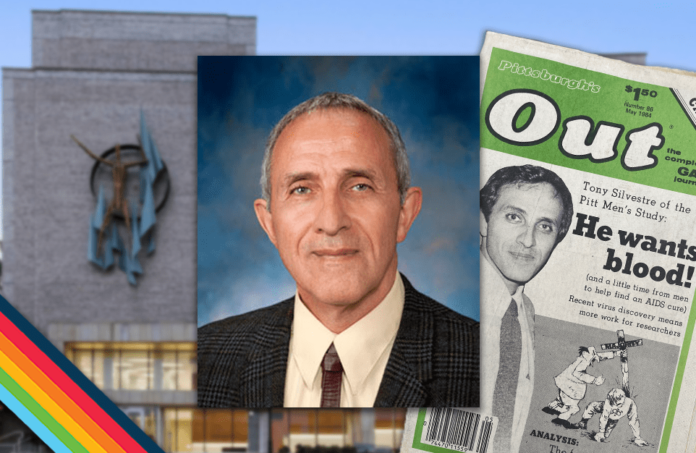Dr. Anthony Silvestre, who chaired the trailblazing Pennsylvania Council for Sexual Minorities in the 1970s, passed away September 1 at his home in Vermont. He was 76 years old. The news was first reported by QBurgh.
Silvestre was born in 1946 in the Bronx, New York and first identified as gay when he was in sixth grade. After graduating high school, he joined a religious community near Boston called Holy Cross Brothers, but after three years and with growing disillusionment with the church, he left to finish his undergrad education at King’s College in Wilkes Barre, Pa. He then enrolled at Penn State to get a Masters degree in sociology.
While at Penn State, Silvestre got involved with the group Homophiles of Penn State and ultimately became its president. During that time, he met LGBTQ leaders from all over the commonwealth. He moved to Philadelphia in 1976 and that same year was appointed by Governor Milton Shapp to chair the newly created Council for Sexual Minorities, the first government-appointed, government-supported commission whose sole purpose was to study and improve the lives of LGBT people. He was also active in the Pennsylvania Rural Gay Caucus, which was formed by leaders of various LGBTQ groups around the state.
“We, our group, was very diverse, in every way,” Silvestre said in a 2016 interview with the LGBT Center of Central Pennsylvania History Project. “And I think that there was therefore a lot of education that went on among members about the needs of different populations… the Caucus was a great source of information and communication, and as a result it educated all of us as to the kinds of issues that people were facing and because we could come together allowed for sort of a big brain trust to try to figure out how to move society along.”
In Philadelphia, Silvestre was an organizer for the Human Rights Campaign Fund local office, gave lectures at the Gay Community Center (including one titled “From Church Basement to the Capitol”), and served as executive director of the Eromin Center, which was established in 1973 to provide safe mental health care to sexual minorities. At the time, much mental health care for LGBTQ people centered around bogus “cure-based” approaches, including conversion therapy. After five years with the organization, Silvestre was removed from his position, an action which many in the community found to be unwarranted. The organization permanently closed the year after Silvestre’s removal due to financial mismanagement.
In March 1984, Silvestre was hired by the University of Pittsburgh to research the HIV/AIDS epidemic as part of the Pitt Men’s Study. Silvestre helped find and recruit thousands of gay men to participate in the study, which was run by Dr. Charles Rinaldo. At the time, it was one of only five studies funded by the federal government to try and uncover risk factors for AIDS. Silvestre and his colleagues created a community advisory board, which helped fine tune the marketing to recruit those most affected by and most at risk for HIV/AIDS.
“It was probably one of the first in the country dealing with HIV,” Silvestre told the LGBT Center of Central Pennsylvania History Project. “And that community advisory board had some of the most popular gay bar owners and gay bartenders — it had the head of MCC, Metropolitan Community Church, it had other well-known celebrities in the gay community. And so these people helped us fashion the marketing, they helped us get into the bars, they gave us an opportunity to do a training session for all bartenders about AIDS so that those bartenders could themselves act as educators in the bars. We were able to develop even cocktail napkins that had information about AIDS that the 17 bartenders would give out.”
The community advisory board also created the Pittsburgh AIDS Task Force, which still exists today.
Silvestre remained with the University of Pittsburgh for over thirty years. He utilized his position to educate people on the vital need to create programs and messaging that are LGBTQ-specific, something he learned during his time with the Council for Sexual Minorities and Rural Gay Caucus. Without such visibility in messaging, it can be difficult to reach people where they are.
During the end of his interview with the LGBT Center of Central Pennsylvania History Project, Silvestre spoke about the realities of LGBTQ activism in the early days of the fight for equality.
“I know activists in Pennsylvania who have had, have been shot at, have been threatened, who’ve been attacked one way or another, who’ve been pressured by their employers and so on. But even in the face of that [they] kept being active with not much reward. Even from within the community I remember vividly early on in the days of being told more than once to stop rocking the boat, gay people were afraid that if we rocked the boat too much they would become visible and therefore begin suffering consequences of stigma. And so being a gay activist didn’t mean that you made friends with a lot of gay people, sometimes people avoided you.”
Dr. Rinaldo, who worked with Silvestre for decades, told QBurgh that he remembers his coworker as a dedicated and inclusive leader.
“We are very saddened by the news of Tony’s passing. Tony was with us from the beginning in 1984 and was the lifeblood of the Pitt Men’s Study. His calm yet forthright dedication and lifelong commitment to the Pitt Men’s Study is truly admirable. He brought a passion and inclusiveness to his job that helped shape the Study to what it is today. Indeed, the success of our study over its 40 years is largely based on Tony’s outstanding leadership. As my colleague for all these years but most importantly as my friend, he will be missed.”
